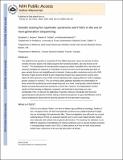| dc.contributor.author | Brown, Elizabeth J. | en_US |
| dc.contributor.author | Pollak, Martin R. | en_US |
| dc.contributor.author | Barua, Moumita | en_US |
| dc.date.accessioned | 2014-12-02T21:28:51Z | |
| dc.date.issued | 2014 | en_US |
| dc.identifier.citation | Brown, Elizabeth J., Martin R. Pollak, and Moumita Barua. 2014. “Genetic testing for nephrotic syndrome and FSGS in the era of next-generation sequencing.” Kidney international 85 (5): 1030-1038. doi:10.1038/ki.2014.48. http://dx.doi.org/10.1038/ki.2014.48. | en |
| dc.identifier.issn | 0085-2538 | en |
| dc.identifier.uri | http://nrs.harvard.edu/urn-3:HUL.InstRepos:13454791 | |
| dc.description.abstract | The haploid human genome is composed of three billion base pairs, about one percent of which consists of exonic regions, the coding sequence for functional proteins, also now known as the “exome”. The development of next-generation sequencing makes it possible from a technical and economic standpoint to sequence an individual’s exome but at the cost of generating long lists of gene variants that are not straightforward to interpret. Various public consortiums such as the 1000 Genomes Project and the NHLBI Exome Sequencing Project have sequenced the exomes and a subset of entire genomes of over 2500 control individuals with ongoing efforts to further catalogue genetic variation in humans.1 The use of these public databases facilitates the interpretation of these variant lists produced by exome sequencing and, as a result, novel genetic variants linked to disease are being discovered and reported at a record rate. However, the interpretation of these results and their bearing on diagnosis, prognosis, and treatment is becoming ever more complicated. Here, we discuss the application of genetic testing to individuals with focal and segmental glomerulosclerosis (FSGS), taking a historical perspective on gene identification and its clinical implications along with the growing potential of next-generation sequencing. | en |
| dc.language.iso | en_US | en |
| dc.relation.isversionof | doi:10.1038/ki.2014.48 | en |
| dc.relation.hasversion | http://www.ncbi.nlm.nih.gov/pmc/articles/PMC4118212/pdf/ | en |
| dash.license | LAA | en_US |
| dc.title | Genetic testing for nephrotic syndrome and FSGS in the era of next-generation sequencing | en |
| dc.type | Journal Article | en_US |
| dc.description.version | Version of Record | en |
| dc.relation.journal | Kidney international | en |
| dash.depositing.author | Pollak, Martin R. | en_US |
| dc.date.available | 2014-12-02T21:28:51Z | |
| dc.identifier.doi | 10.1038/ki.2014.48 | * |
| dash.contributor.affiliated | Pollak, Martin | |


